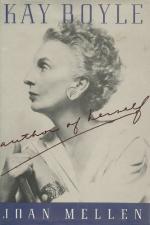|
This section contains 3,034 words (approx. 11 pages at 300 words per page) |

|
SOURCE: "Call Forth a Good Day: The Nonfiction of Kay Boyle," in Twentieth-Century Literature, Vol. 34, No. 3, Fall, 1988, pp. 384-91.
In the following essay, Bell argues that Boyle's essays are proof of Boyle's conviction that writers must be a voice of consciousness and accountability.
Noted as a stylist and awarded distinguished recognition for her short fiction, Kay Boyle, in her prodigious writing during the 1930s, earned for her fiction and poetry an enthusiastic and discriminating following. Her later reputation, born perhaps from her reporting of post-World War II Europe and nurtured in the caldron of McCarthy's 1950s, encompasses another element of Boyle's concept of what a writer should be, for Kay Boyle is now additionally recognized as an articulate spokesperson for a variety of political and social issues, a voice of society's conscience, and—not coincidentally—a crafter of the essay as well. Rather than being a separate manifestation...
|
This section contains 3,034 words (approx. 11 pages at 300 words per page) |

|


